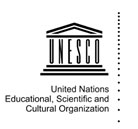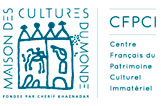
The United Nations Educational, Scientific and Cultural Organization (UNESCO) is a specialized agency of the United Nations (UN). It has the purpose to contribute to peace and security by promoting international collaboration through educational, scientific, and cultural reforms in order to increase universal respect for justice, the rule of law, and human rights along with fundamental freedom proclaimed in the United Nations Charter.
 The Cultural Informatics research group based at the University of Brighton, undertakes research across a spectrum of interdisciplinary areas to support the development and use of digital collections. Research focuses on technical areas, including 3D virtual environments, archives and collections management systems, web and museum based interactive applications and language technologies; and non-technical areas, including testing, economic and social impact evaluation in support of the development of the cultural heritage sector and its opportunities in tourism, entertainment and education.
The Cultural Informatics research group based at the University of Brighton, undertakes research across a spectrum of interdisciplinary areas to support the development and use of digital collections. Research focuses on technical areas, including 3D virtual environments, archives and collections management systems, web and museum based interactive applications and language technologies; and non-technical areas, including testing, economic and social impact evaluation in support of the development of the cultural heritage sector and its opportunities in tourism, entertainment and education. The Maison des Cultures du Monde (MCM) is a non-governmental organization founded in Paris in 1982, dedicated to supporting cultural diversity and promoting intangible cultural heritage (ICH). Welcoming traditional performing arts, the MCM also provides a space for reflection and dialogue. The MCM’s international resource centre was opened in Vitré, Britanny, in 2004. This fund comprises the archives of MCM, and a collection of items and objects. In accordance with the Convention for the safeguarding of ICH, ratified by French government in 2006, the Ministry for Culture has designated this Centre as a competent body for the safeguarding of the ICH present on its national territory. In 2011, it became the French Centre for ICH. Dedicated to informing, documenting, training and debating on living heritage, this center is also a network of actors invested in the various fields of ICH. Finally, it is a tool for raising public awareness on the safeguarding of ICH through exhibitions, educational workshops, conferences and other activities.
The Maison des Cultures du Monde (MCM) is a non-governmental organization founded in Paris in 1982, dedicated to supporting cultural diversity and promoting intangible cultural heritage (ICH). Welcoming traditional performing arts, the MCM also provides a space for reflection and dialogue. The MCM’s international resource centre was opened in Vitré, Britanny, in 2004. This fund comprises the archives of MCM, and a collection of items and objects. In accordance with the Convention for the safeguarding of ICH, ratified by French government in 2006, the Ministry for Culture has designated this Centre as a competent body for the safeguarding of the ICH present on its national territory. In 2011, it became the French Centre for ICH. Dedicated to informing, documenting, training and debating on living heritage, this center is also a network of actors invested in the various fields of ICH. Finally, it is a tool for raising public awareness on the safeguarding of ICH through exhibitions, educational workshops, conferences and other activities.

